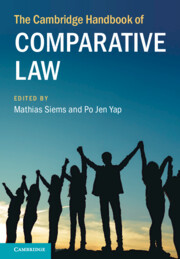Book contents
- The Cambridge Handbook of Comparative Law
- The Cambridge Handbook of Comparative Law
- Copyright page
- Contents
- Figures
- Tables
- Contributors
- Preface
- Abbreviations
- 1 Introduction
- Part I Methods of Comparative Law
- Part II Legal Families and Geographical Comparisons
- Part III Central Themes in Comparative Law
- Part IV Comparative Law beyond the State
- 28 Comparative International Law
- 29 Transnational Regulation
- 30 Quantitative Forms of Legal Governance
- 31 Comparative International Arbitration Law
- 32 Cross-Border Judicial Dialogue
- 33 Comparing Regional Law
- 34 Comparative Conflict of Laws
- 35 Comparative Indigenous Law
- 36 Comparative Legal Education
- Index
33 - Comparing Regional Law
from Part IV - Comparative Law beyond the State
Published online by Cambridge University Press: 26 January 2024
- The Cambridge Handbook of Comparative Law
- The Cambridge Handbook of Comparative Law
- Copyright page
- Contents
- Figures
- Tables
- Contributors
- Preface
- Abbreviations
- 1 Introduction
- Part I Methods of Comparative Law
- Part II Legal Families and Geographical Comparisons
- Part III Central Themes in Comparative Law
- Part IV Comparative Law beyond the State
- 28 Comparative International Law
- 29 Transnational Regulation
- 30 Quantitative Forms of Legal Governance
- 31 Comparative International Arbitration Law
- 32 Cross-Border Judicial Dialogue
- 33 Comparing Regional Law
- 34 Comparative Conflict of Laws
- 35 Comparative Indigenous Law
- 36 Comparative Legal Education
- Index
Summary
Regional collaboration between states is increasingly vital to address the challenges of our time. Yet many regions struggle to collaborate effectively. Comparative regional law can contribute to effective regional collaboration. But it can also make a valuable contribution to the discipline of (comparative) law more generally, especially to rethinking the connection between law and the state, and better connecting our legal discipline to empirical methods. This contribution first sets out some key challenges for comparative regional law. For example, how to validly compare regions with vast and vital differences in history, (legal) culture, geography, language, and economies, and avoid pitfalls like EU-centrism or colonialism. As always in comparative law, no single perfect answer or method exists to address these challenges. Yet this contribution aims to help stock the comparative toolbox, so that researchers can pick and combine the proper methodological tools for the research questions they want to pursue. The main claim therefore is that, considering the nature of regional law, a functionalist method, complemented and checked by more critical methods, might often be a suitable approach. If done carefully, like two hedgehogs making love, comparing regional law can then produce academically and practically valuable results.
- Type
- Chapter
- Information
- The Cambridge Handbook of Comparative Law , pp. 649 - 673Publisher: Cambridge University PressPrint publication year: 2024

